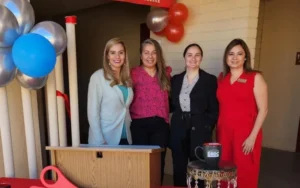

Yuma, AZ (November 30, 2022) – The Arizona Western College Small Business Development Center was recently renovated to better serve entrepreneurial clients in Yuma and La Paz counties.
Changes to the facility were unveiled to the public during a ribbon-cutting ceremony on Thursday, November 17.
Prior to the renovations, the center consisted of one large classroom and two offices. Now, the space consists of four cubical workstations, a director’s office, conference room, client waiting area, and a break area for employees. The facility has also been decorated with artwork from local artists and features framed business success stories from past clients.
The renovations were made possible due to funding from the Cares Act Grant, Proposition 301 dollars, and institutional funding. The total estimated cost of the renovation is $40,000.
The Small Business Development Center (SBDC) delivers professional, high-quality, individualized business advising and technical assistance to existing small businesses and pre-venture entrepreneurs. Center staff provides problem-solving assistance to help small businesses access capital, develop and exchange new technologies, and improve business planning, strategy, operations, financial management, personnel administration, marketing, export assistance, sales, and other areas required for small business growth and expansion.
During 2021, the SBDC contributed to the growth of the local economy by generating $3.2 million in capital formation, $5.6 million in sales growth, and $43.9 million in annual sales.
“We are excited to continue making an economic impact in our communities, which is why we have launched our Please Buy Local Campaign,” said SBDC Director Crystal Mendoza. “We have distributed 800 flags and 20 banners to serve as a reminder to our community of the importance of buying local. It is important to remember that our friends and neighbors own these businesses and if we support them, they will hire people within the community, which in turn increases jobs. In addition, when we buy local, a greater part of every dollar spent stays locally, which also helps with public infrastructures, roads, and public transportation.”
